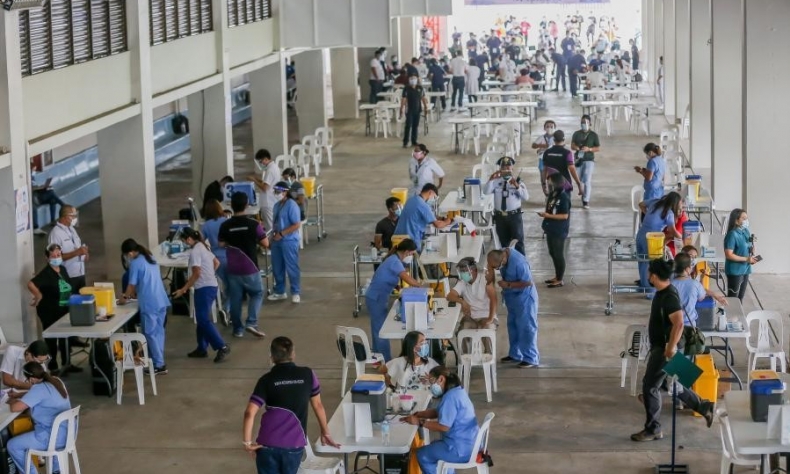Contrary to Western Hysteria, China’s Vaccinations Are Gathering Pace

Having been able to defeat COVID-19 domestically, China is opting to support the rest of the world by supplying to nations in need who have been put to the “back of the queue” by the West.
As of the end of February, more than 52 million doses of COVID-19 vaccines have been administered across China. Dr. Zhong Nanshan, the country’s leading respiratory disease expert, has stated that plans are now in place to vaccinate over 500 million people, or roughly 40% of the total population, by the summer.
The news comes amid a relentless campaign by Western media to try and discredit China’s vaccination drive. In reports by some Western media outlets, China’s vaccinations have been repeatedly compared in a zero-sum competition with that of the United States, which, having suffered over 28 million cases of COVID-19 and 500,000 deaths, is rolling out the vaccine at a faster pace. But this kind of coverage is misleading. It overlooks the fact that for countries such as America and Britain, quickly vaccinating their populations is the only solution they have for overcoming COVID-19 and returning to normal life, having repeatedly failed to contain its spread. China is not beset by such urgency.
Secondly, these countries have aggressively hoarded vaccine supplies at the expense of others, even allied countries, while China has dramatically accelerated its support for the developing world. But even then, it’s obvious China is not falling behind in any capacity.
An obsession with failure
The Western mainstream media has a clear ideological bias when it comes to China, carrying heavy assumptions in respect to every scenario that China’s political system is flawed, inferior and doomed to fail. When COVID-19 first struck China, the outbreak was widely derided as a failure of the country’s political system; something that could not happen in the “transparent” West. Then when it did, the narrative immediately changed to imply that China was responsible for their failures via a coverup. The Western political model is regarded as a sacred political truth, and to confer praise on China’s model is depicted as akin to blasphemy, therefore it must be deprived of success at all costs and painted in wholly negative terms.
Of course, this approach is highly dubious, since it fails to confront the reality that over the past year China has successfully contained the virus, curbed new outbreaks, life has returned to normal, and the economy is growing. Therefore, when the time finally came to focus on vaccinations, the media have been quick to lash out with ideologically focused criticism aimed at discrediting China’s vaccine drive as “failing” – just like it did with the early stages of the COVID-19 outbreak. Various news outlets have accused Chinese people of refusing to take vaccines and a “general lack of urgency” – while the rollout speed in the U.S. has been praised, glossing over the half a million dead as if it no longer matters.
Vaccine nationalism vs. global solidarity
But the circumstances are hardly the same, and it is ridiculous to try and condense vaccinations into a zero-sum ideological contest. The only way for countries such as America to overcome COVID-19 is to vaccinate their populations, because every other method has failed. American politicians and elites have aggressively resisted lockdowns, mere talk of wearing masks continues to ignite controversy, and the people themselves have been unwilling to make the necessary sacrifices in order to social distance and defeat COVID-19. This means vaccines are a last resort in curtailing a never-ending death toll. China does not have this problem. Even though it is pushing ahead with vaccinations, it has sought to roll out its vaccines safely and scientifically. It is not relying on vaccines alone to defeat COVID-19.
This aspect has also meant the U.S. and others have aggressively stockpiled vaccines and resorted to “vaccine nationalism” putting their own countries above others. President Biden’s administration has stated it will not consider other countries until it has taken care of itself. China is not beset by this weakness, and has pledged to make the vaccine a global public good, donating and providing vaccines to a growing number of countries on every continent.
As of March 1, it has distributed vaccines to almost every single country in South America, most of the Middle East, numerous countries in Africa and most of Southeast Asia. As a result, China has been willing to strain its own vaccine supplies for the good of others. However, this has not subdued its own progress as much as the mainstream media have suggested.
In the end, the comparison between Washington and Beijing on this matter is a question of “unilateralism vs. multilateralism.” One country has squarely put itself first in the race for herd immunity – a testimony to government failure in combating the virus. Meanwhile, having been able to defeat COVID-19 domestically, China is opting to support the rest of the world by supplying to nations in need who have been put to the “back of the queue” by the West.
 Facebook
Facebook
 Twitter
Twitter
 Linkedin
Linkedin
 Google +
Google +







